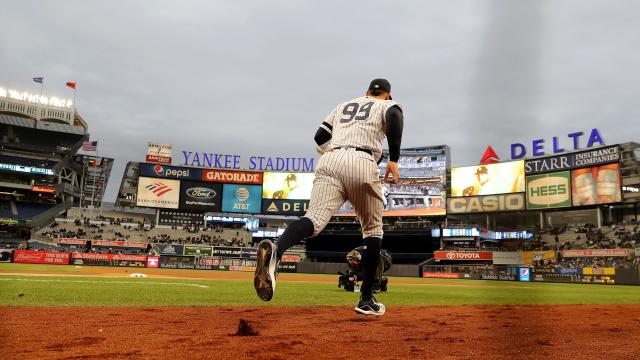When it comes to the New York Yankees, it’s simple: You either love ‘em or, like certain Gizmodo editors
However, being the first and only baseball team in the world to align itself with the Paris Climate Agreement is definitely one way to pique the interest of a sport neutral who also loves the planet.
The New York Yankees signed onto the United Nation’s Sports for Climate Action Framework Wednesday, finally adding some U.S. representation among the international signatories, which include FIFA and the International Olympic Committee.
“With their rich winning tradition, the Yankees bring a new level of leadership to global efforts to tackle climate change,”said United Nations Secretary-General and evident Yankees stan António Guterres in a statement. “When it comes to safeguarding our future, it’s time to play ball,” Guterres, who apparently likes bad puns in addition to hated sports teams, continued.
The U.N. announced the initiative back in December 2018 with the goal of uniting sports teams, organisations, their athletes, and fans to take action to meet the greenhouse gas reduction goals of the Paris Agreement to limit global warming to 2 degrees Celsius.
The framework ultimately calls for the “net-zero emission economy of 2050” laid out in the Paris Agreement.
The world of sports can make this happen by committing to a set of five principles, including making systemic changes to improve environmental responsibility, reduce overall climate impact, education, promoting sustainable consumption, and advocating. In short, the U.N. wants sports organisations to bake sustainable policies into their business plans by measuring their greenhouse gas emissions, setting forth plans on how to reduce them, and helping teach their fans about climate change and how to be a better steward.
Half of Americans are sports fans, per Gallup, so the U.N. may be onto something.
But that’s not the only reason to target the world of athletes. The sports industry has a history of treating our planet the same way LeBron James treats his basketball: very roughly.
A 2018 report published in the Journal of Carbon Research lays out the different sources of carbon emissions across the industry. All the electricity to power those giant stadiums comes at a cost if sourced from dirty energy and so does the gas their visitors use to drive there. For instance, eighty per cent of the National Hockey Leagues’s annual emissions are due to energy use at its arenas and offices, according to its 2014 Sustainability Report.
In the 2012-2013 season, that amounted to nearly 400,000 tons of carbon dioxide, equivalent to some 83,000 cars driving for a year.
Some sports industries have grown increasingly aware that they’ve got a stake in protecting natural resources. Snow sports are particularly vulnerable—like the famous Iditarod dog sled race or ice hockey.
As concern about climate change catches on, a number of major sports leagues like the National Football League and NASCAR are beginning to power their giant stadiums with solar. In fact, all these systems can create enough combined energy to power 8,000 American homes as of June 2018, according to the Solar Energy Industries Association.
This U.N. Sports for Climate Action Initiative doesn’t have any mechanism for enforcement, meaning right now, signing on amounts to little more than some good PR for the Yankees. But it does open the door for teams to learn more about how they can be better planetary stewards, offering them guidance through meetings where they can develop their plans with the help of others. The U.N. has also reserved the power to kick individuals out if they ain’t really about it.
The Yankees have taken baby steps on climate change before—like creating an environmental science advisor position earlier this year—but they still have a long way to go. After all, Yankee Stadium still isn’t equipped with solar panels, and the team doesn’t publicly disclose its carbon footprint. There’s no better time than the present, especially after signing onto this international commitment.
